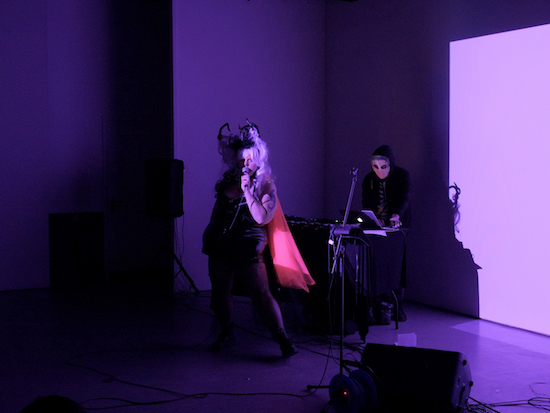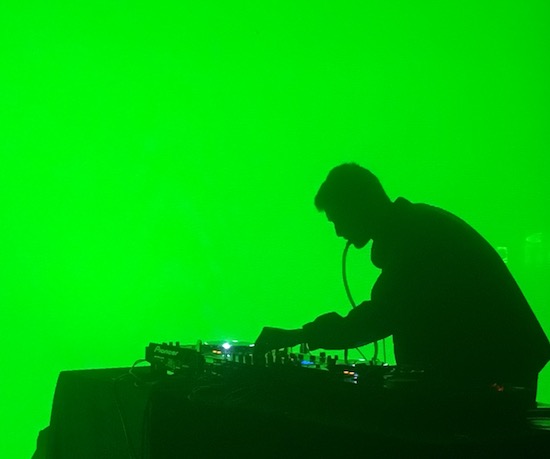Live shots by Outlands/ Miles Umney
Milton Keynes is a rigidly designed grid of buildings, a massive commercial hub at the centre with residential estates radiating outwards. The central block of buildings boasts every chain shop and restaurant you can think of, plus mini golf, indoor skydiving and VR experiences. It’s kind of like The Good Place if you’re feeling generous, Vonnegut if you’re feeling cynical – it has everything a type-1 person could ever want, but with none of the soul.
It is therefore the last place you might expect a conference about mould-breaking interdisciplinary art forms to take place – but maybe it’s the perfect place. If passion for the non-conforming can exist in a place so uniform and commerce-driven, then perhaps it can thrive anywhere.
It’s also relatively central in the country, which meant that people from up and down the land came to partake in The Joyous Thing, the first conference-come-event put on by the Outlands Network at the MK Gallery – entirely free to anyone wishing to attend. Representatives from Network members like De La Warr Pavilion (Bexhill), Fat Out (Manchester), Supersonic (Birmingham), Fuse Arts Festival (Bradford), Qu Junktions (Bristol) were all in attendance, as well as people from other arts organisations, for a weekend that involved celebrating Outlands’ work so far and looking ahead to the massive challenge of maintaining funding support for years to come.
Outlands’ project director Caleb Madden introduced the weekend as a celebration of “this thing that we call, for better or worse, ‘experimental music’”, the first of many to remark upon the awkward nomenclature that we’ve given to this rough loop that we draw around “challenging” music. Picking up the baton, tQ Ed John Doran gave the latest iteration of his New Weird Britain talk, discussing the past, present and future of the field through the etymology of the word “weird” and musicians with psychic abilities, and in his idiosyncratic way summing up the passion and the problems that would be displayed and discussed throughout the rest of The Joyous Thing.
Later, silhouetted against the large screen of MK Gallery’s performance space, Milton Keynes act Secret Flight put on an atmospheric performance, her voice soaring above glacial synths. In a moment of genuine gratitude, she expressed how hopeful and heart-warming it was that something like The Joyous Thing was taking place in her home town, a reminder that Outlands’ work is appreciated and necessary. Her passionate display was followed by the taciturn sonic exploration of rf wn, his unusual sounds creeping across the room as a kind of experiential musique concrète.
Natalie Sharp’s BodyVice performance was what a lot of people had been most excited to see, and she, along with collaborator Tida Bradshaw did not disappoint. Although taking place in MK Gallery’s beautiful Sky Room, the performance placed us inside the inner monologue of someone locked inside an MRI scanner. At first lulled into placidity through a reading by Doran, BodyVice’s true intent soon enclosed the audience in the dark, loud and disorienting mind of its creator – with the intensity never subsiding.
Understandably, people wanted to talk to Sharp all about BodyVice following that, and loud discussions were being had in the courtyard outside afterwards – but as soon as Godspeed You! Peter Andre started their otherworldly performance the chatters all were powerless to resist the warbling siren call, filing into the performance space to be transported.
Dressed in a black leather cocktail dress, big black boots, a neon orange cape and a blonde wig topped by mottled antlers from some demonic creature, Emma Thompson roamed the room as she vocalised, dominating it. Backed by a DJ in a skeleton t-shirt and a Peter Andre mask playing pulverising bass beats, Thompson took us on an aural voyage. “Humanity has been dismissed,” she snarled repeatedly early on, and the performance then seemed to follow the ushering of the entirety of the human race into the underworld, via wails of dismayed spirits. With few moments of respite in their show, the effect on the crowd was physical, with Natalie Sharp and others convulsing on the floor in appreciation by the end.

As fun as the Saturday night was, the Sunday of The Joyous Thing was arguably more important, as all the heads in attendance joined forces to discuss how we maintain this work – and keep it positive. Fielding Hope, of Cafe Oto and Counterflows festival, set the tone for the day with his impassioned presentation in which he didn’t shy away from the harsh realities that a majority Conservative government and the UK’s impending exit from the EU are going to bring to bear on marginalised artists. “Should we form a lobbying group?” he asked at one point, and while most people were probably nursing hangovers too heavy to really contemplate the suggestion at the time, it is genuinely something that could be considered moving forward – and the Outlands Network should form the core of it.
The first panel discussion of the day posed the question, "How can we work with institutions to reach audiences?", with representatives from members of the Outlands Network each putting forward their thoughts on the matter. The question was posed as to whether visual arts are more valued than musical, but this was something that not everyone could agree with. In fact, it was reported that art galleries can often be easier to work with than the big mainstream venues that cost so much that it’s not viable. Art galleries, like the one that hosted us, are supposed to sit at a town centre – not just physically, but consciously. The best curators among them understand this, realising that they should put in the effort to represent as many different art forms as possible, while corporate venues just want to know if you’re going to bring enough money at the bar.
The fact was also brought up that while some arts funders might be keen to support the more unusual projects at first, they can soon turn cold once the honeymoon period is over and they haven’t seen the kinds of returns they’d hoped for. It’s a problem that has seen several projects have their funding pulled out from under them before they’ve even got up to full speed – but the Outlands Network was formed to pool expertise and combat situations like this. Although an existentially worrying discussion, De La Warr Pavilion’s chief executive Stuart Drew assured us that he’s never seen a network so unified as Outlands, and he has faith that by banding together we will figure it out.
A more contentious air presided over the second panel of the day, which was about accessing funding, and featured two representatives from Arts Council England, Chloë Brookes and Adrian Cooke, who came under some scrutiny from disgruntled artists in attendance. The suggestion was raised that the Arts Council has an image problem, with artists feeling intimidated by the amount of information they have to provide about their art in order to apply for funding. “I don’t communicate in words,” Natalie Sharp bluntly stated, asking if there could be a different medium through which to apply, while Lisa Meyer from Capsule suggested that perhaps they could offer more guidance on navigating the forms.
While slightly defensive, the ACE representatives listened to all of the concerns and assured everyone in attendance that it’s not as difficult as they perceive and that they’re always happy to talk people through the process. Despite their attempts to assuage doubts, there still seemed to be a divide at a basic level between how realistic it is for artists to try to explain their work’s intentions in words. Positivity came once again from De La Warr’s Stuart Drew, who wanted to praise the ACE representatives for their energy and openness towards projects, and even if Chloë and Adrian didn’t explicitly say that they would try to change the funding application process, we can be sure that they took onboard what they heard and will feed back to their higher ups.
After a rather serious morning, it was time for The Joyous Thing to do what its name suggested again, and presentations were given to recount the successes of the Outlands Network so far – and there has been plenty to celebrate. Insights from the Ecstatic Material tour between electronic musician Beatrice Dillon and artist Keith Harrison; stories from the the Ensō Sone tour between Japanese psych rockers Qujaku and visual artists IMPATV; and video of Fracture Patterns, the combination between vocalist Eartheater and artist Semiconductor, were all more than enough to give everyone a heavy dose of regret at having missed out. Furthermore, the town of Todmorden is now firmly on the “must visit” list as it’s proving to be an unlikely bastion of unusual music events thanks to the efforts of Sophie Cooper and Tor Festival.
To wrap up the conference portion of the day, the opportunity was given for anyone in attendance to raise any further thoughts or queries. Suggestions were made that in future editions of The Joyous Thing there could be more practical advice, literally taking people through, ‘How to tour on a budget’ or ‘How to run an independent venue’, while important questions were raised for people to take home, like how to increase diversity in the scene.
Rapping up the event with a bit more lightheartedness was the experimental music quiz, hosted by Jennifer Lucy Allan. A test unlike any likely to be experienced in your usual pub environment, highlight rounds included ‘name that drone’, ‘Mark E Smith lyric or Wiley Bar?’ and the task of drawing Prince’s symbol from memory. If you must know, tQ came second after a disastrous Brian Eno ambient round.
With the schedule done, there was a cloud of optimism hanging over those remaining. Despite the challenges raised and the uncertainty on the horizon, there was a feeling of collective spirit, and Outlands felt like a true Network.



